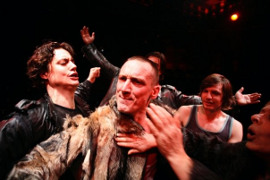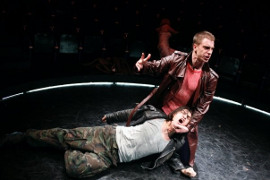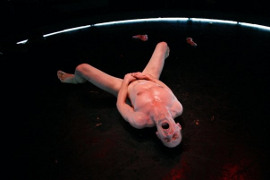
A Riveting "Macbeth After Shakespeare"
from Slovenia
Reeks of Danger and Testosterone, Murder and Brilliance
 |
| Domen Valic, Marko Mandic, Stipe Kostanic, Jurij Drevenšek, Milena Zupancic in "Macbeth After Shakespeare” | Photo by Miha Frass and SONDA |
Heiner Müller’s "Macbeth After Shakespeare"
Director: Ivica Buljan
Translator: Milan Štefe
Costume designer: Ana Savic Gecan
Set designer: son:DA
Composer: Mitja Vrhovnik Smrekar
Choreography: Tanja Zgonc
Dramaturg: Diana Koloini
Language consultant: Mateja Dermelj
Producer: Robert Waltl
Actors: Marko Mandic, Milena Zupancic, Polona Vetrih, Jurij Drevenšek,
Jure Henigman, Jose, Stipe Kostanic, Domen Valic, Anže Zevnik
Presented by La MaMa E.T.C. in association with Mini Teater Ljubljana (Slovenia)
and Novokazalište Zagreb (Croatia)
Ellen Stewart Theatre at La MaMa, December 8–11, 2011
Reviewed by Randy Gener
NEW YORK CITY: Flashing red police lights streak across the stage’s
dark expanse. The air is thick with the smell of danger and testosterone
and murder and evil. Seven lean young tough guys, mostly dark-haired and
haughty and without shirts on, radiate militant aggression on a wide semicircle
of folding chairs. They might be in a Balkan war camp or an underground
fight club. The barebones scenography by the visual-art group son:DA (Miha
Horvat and Metka Golec) tells us otherwise; it is not ambiguous at all where
these glowering bucks are. Taped center-stage on the black ground are huge,
white block letters; these coordinates spell out the latitude and longitude
location of LaMaMa’s Ellen Stewart Theatre, where this ferociously
extreme and brawny "Macbeth After Shakespeare" runs through Dec.
11.
Garbed in a plain gray-green military outfit and played by the mesmerizing actor Marko Mandic, Macbeth waits on the sidelines, like a cat ready to pounce (just as as the rest of the actors do when it isn’t their turn to perform). Jure Henigman, a large longhaired stallion, muscles into center of the chaos, declares that he is King Duncan and inquires of "the newest state of revolt." He grabs a fellow soldier. The two men lock fists and with arms extended spin in circles. Slamming their hard bodies on the Scottish ground, they wrestle for a bit. Then, as Mitja Vrhovnik Smrekar’s pulse-pounding turbo-folk score blares in the background, the soldiers do pushups before springing to their feet to hear news of Macbeth’s victory in the battle against the Scottish traitors who sided with the Norwegians.
It might have been 1971 when the East German playwright Heiner Müller stripped and gutted Shakespeare’s tragedy "Macbeth," leaving only a carcass of blood, guts and genitals. A dedicated Marxist, Müller might have disemboweled Shakespeare’s handiwork at a distant moment of communist history. Yet these actors from Slovenia and Croatia, who have brought alive in New York this thrillingly physical and phantasmagorical production of Müller’s travesty of Shakesepare’s classic text, situate us resolutely here and insist that this is about now. A collaboration between Mini Teater Ljubljana (Slovenia) and Novokazalište Zagreb (Croatia), director Ivica Buljan’s "Macbeth After Shakespeare" forces us to viscerally come face to face with the naked and overbearing fact that the pornography of power is both beautiful and disturbing to look at. It seduces and repels and provokes. It is also a heartless and disastrous and ever-present scourge. The adrenaline rush of uprisings, the limits of excessive ambition, the violence of mob mentality, the sexuality of domination and the callous indifference to human life—these are all spectacles that know no historical time periods and no geographic boundaries.
 |
| Stipe Kostanic and Jure Henigman in Heiner Muller's "Macbeth After Shakespeare" | Photo by Miha Frass and SONDA |
As Buljan and company have put on debauched display before us, Müller was not interested in plumbing psychological depths. In "Macbeth After Shakespeare," he was motivated by the need to dramatize the void left by the degradation of language. Using complex stage pictures, he wanted to theatricalize the damages on human individuality wrought by the political idea of the collective. Human beings lacked worth. Language was inadequate to the task of bringing dignity to individuals. When fascistic currents kick in, the individual is cut adrift in a tempest of anonymity. Consequently, blurted in fast clips and rhythmic spurts, Müller’s deracinated-poetic-scarifying words come down upon our heads and the theatre-of-cruelty proceedings like so much acid rain. And with the exception of a few main players — Marko Mandic as a riveting Macbeth, Milena Zupancic as a kittenish Lady Macbeth and Polona Vetrih as a reserved Banquo — Buljan’s ensemble of nine dynamic actors (two women complete the cast) morphs into multiple characters, and it is occasionally difficult to keep track of who’s doubling who and or tripling into what.
Absolutely roiling with frantic, riotous and masculine energy, Buljan’s "Macbeth After Shakespeare" pulls out all the stops to draw us into a hurricane of desire, brutality and self-annihilation. At one point, we don’t just a cauldron of the three witches whose prophecies give Macbeth a false sense of security. Instead, as Macbeth and Banquo return home from battle, they are literally drawn into a vortex of group sex. Sick with lust, an orgy of men taunts Macbeth with the promise of the Scottish throne not with the heebee-jeebies of the supernatural but with wild and uninhibited man-on-man worship: crotches are grabbed, asses humped, muscles flexed, and engorged penises sucked.
Unfortunately most of us non-Slovenian speakers will never be able to fully savor and digest the scene-to-scene flow of this foreign-language "Macbeth After Shakespeare" — even though the English-language translation by Carl Weber has been projected on a giant screen on the rear of the playing areas. If a glowing light bulb overhead does not obscure them, the bodies of the actors sometimes block the projected words, which keep racing forward in a worthless effort to keep up with the frenzied line-readings and rough games. To be honest, these problems do not ultimately matter. So long as you know Shakespeare’s Macbeth, you can easily follow Buljan’s exquisitely vulgar production.
The real surprise of "Macbeth After Shakespeare" is that for all of its deconstruction and appropriations, Müller’s narrative hews close to Shakespeare’s original story. The blizzard of words that scrawl behind the actors is itself a masterstroke of scenography, because the Barbara Kruger–style mise-en-scène suggests a dreamscape of pell mell, flashing headlines and raw flesh. The carnages that Müller had added to Shakespeare as well as the memorable scenes and aristocratic characters Müller severely defaced crackle with full force and clarity in Buljan’s cogent and wholly coherent production. This "Macbeth After Shakespeare" focuses on the orgiastic revelry that results when the peasant, servant and military classes revolt against the perversities of entrenched power (which in turn had abused and brutalized the lower classes). Nowhere to be found are the lordly warriors and noble aristocrats of Shakespeare’s dignified imaginings. Instead actors Jurij Drevenšek, Joseph Nzobandora, Stipe Kostanic, Domen Valic, Anže Zevnik and Jure Henigman take turns portraying a variety of oafish peasants, loutish servants and thuggish foot soldiers.
What’s impressive here are the controlled anarchy and incredible confidence these performers evince (with Kostanic’s dark-browed killer, Valic’s boyish Seyton and Zevnik’s wiry Macduff being especially interesting for their expressive etchings). Of these guys, Henigman tackles the more visible and meatier roles, and so he is especially memorable. Amid all this testosterone energy, the actress Polona Vetrih stands out, too, as the humble Banquo not just because she is playing male part but also because her Banquo scans as the wariest and most centered soldier. Wearing fur and high heels, Milena Zupancic delivers a Lady Macbeth with a perpetual gleam in her eyes — a dark vixen whose older age conveys clever intelligence and cold calculation.
 |
| Marko Mandic in “Macbeth After Shakespeare” | Photo by Miha Frass and SONDA |
Through the course of Buljan’s production, Marko Mandic’s Macbeth — drunk on the possibility of more power— becomes a despot as bloodthirsty as Henigman’s imposing King Duncan was before him. Müller slashed and burned through many of Macbeth’s long soliloquies and rueful meditations, so Macbeth’s bloody takeover of the Scottish throne could easily translate as yet another banal critique of the takeover of the state authority. Mandics Macbeth, however, rises to mythic yet hyper-realistic heights. An overwhelmingly physical actor, Mandic astonishes because the gritty-scary choices he makes are so specific and the existential despair he later exhibits at the murder he commits comes off as palpably genuine.
His Macbeth is the heart and soul of Buljan’s nihilistic bash. Whether cavorting through audience members or assaulting them, whether he spins guiltily in circles or is stripped butt-naked and spat on and defiled by his fellow actors, whether he exults in triumph or breaks down during his coronation celebration, Mandic takes the sort of incredibly outré risks that would be simply laughable or a catastrophe under lesser talents. Truly entertaining, by no means ridiculous, and in every way essential, Mandic’s exhibitionism pays off brilliantly. This is unquestionably the greatest and most explosive performance of a roaring wreck of a hero that the New York theatre has seen since Mark Rylance’s star turn in "Jerusalem." [RG]
RANDY GENER is a writer, editor, critic, playwright and visual artist in New York City. Author of "Love Seats for Virginia Woolf" and other Off-Broadway plays, Gener is the recipient of the George Jean Nathan Award, the highest accolade for dramatic criticism in the United States, and NLGJA Journalist of the Year, among numerous other awards, for his editorial work and critical essays in American Theatre magazine. Gener most recently helped curate, produce and create "From the Edge," the USITT-USA National Pavilion to the 2011 Prague Quadrennial of Performance Design and Space. His website is www.theaterofOneWorld.org.

| museums | NYTW mail | recordings | coupons | publications | classified |